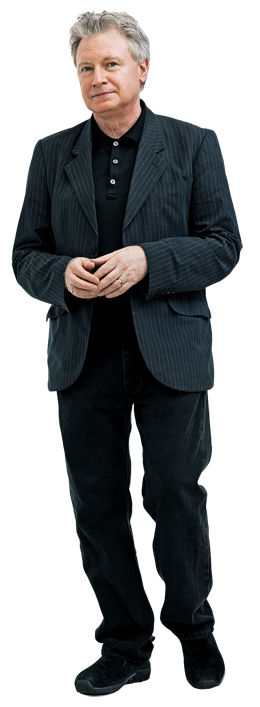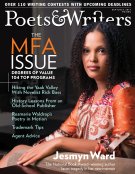Robert Polito, a poet, critic and former director of the writing program at the New School in New York City, is the new president of the Poetry Foundation, which publishes Poetry magazine and offers public readings and other programs at its handsome new headquarters building in Chicago. He replaces John Barr, a poet and financial manager who retired last year. Polito has written two collections of poetry, including Hollywood & God (2009) and Doubles (1995), both published by the University of Chicago Press, as well as Savage Art: A Biography of Jim Thompson (Knopf, 1995), which won the National Book Critics Circle Award. On his first day on the job in early July, Polito, sixty-one, took time out to chat with Poets & Writers.
 Why were you interested in this job?
Why were you interested in this job?
It’s a good question. It’s not as if I didn’t like the job I previously had at the New School, which is as much a community resource as it is an academic institution. This new position seemed like an opportunity to work on the continuum of what I was already doing as a teacher, writer and administrator, but on a larger scale, with greater resources.
So it was a short hop from there to here, not a leap.
That’s my sense of it. If I had been coming from a more conventional academic institution, it might have been a larger leap.
Your predecessor, John Barr, came with a rather different résumé. He is a poet, like you, but he also had a background in the financial world, which was relevant because he helped manage the foundation’s famous endowment. Will you also be overseeing the money?
Yes, of course, in collaboration with our chief financial officer, Caren Skoulas, and various committees of the board of trustees. The exciting thing for me is that the foundation is in terrific financial shape. It’s been very well run for the past ten years. If you look at the various accomplishments—including the building we’re sitting in; the tripling of the readership of the magazine; the development of the single strongest poetry website around; and Poetry Out Loud, our collaboration with the NEA—a lot was achieved during those ten years. And at the New School, I presided over a budget that was a little over half what it is here [about nine million dollars annually]. So I’m used to working with money and staying within budgets.
To what extent will you be involved with the magazine?
The magazine, like the website, is autonomous in all the ways that matter. What I’d like to do is sit down with Don Share, our new editor, on a regular basis and find out what’s coming out in the magazine three or four months in advance, so we can figure out what can be done to promote collaborations with other partners depending on what’s in the magazine in a given timeframe.
Are there new programs you hope to initiate at the foundation?
Yes. The largest thing is that I’d like to shift the conversation about the way poetry is perceived and operates in the culture. I think poetry is generally approached as enhancement and enrichment, and I agree with that. But I think it’s also true that the reading of poetry, in particular close reading, offers vital skills to people that really aren’t available anyplace else.
You’re speaking of textual analysis?
Well, just a close attention to language, which would include textual analysis. The kind of basic questions when you read a poem: Who’s speaking, and to whom? And how is it being said? What are the implications of it being said in this particular way? I think that used to be the graduate and even high school education that people got, up to the 1980s, but it’s dropped out of academia to a large extent, and also out of the culture, to an extent. But the language of poetry is so concise and so concentrated and so open to multiple interpretations that it’s the ideal model for that close attention to language. I’ve had this idea for a while that the history of modernism—and Poetry magazine is very much wrapped up in that history—shows that modernism led to the Internet. You open up your computer and immediately you’re confronted with fragmentation, collage, and unreliable narration. It’s basically “The Waste Land” and Ulysses. And if you don’t understand that language, you end up saying things like, “Keep the government out of my Medicare.” There’s a vital connection, I think, between citizenship and the ability to read different kinds of language closely. And the skills you get from reading poetry are endlessly applicable—to other art forms like photography, painting, and film, but also to other areas. I just think the world is so slippery and ambiguous in a way that’s familiar to people who read poetry. And if we can come up with an approach that emphasizes the practical skill that comes from reading language that is so slippery, and figuring out how that operates in a poem, I don’t see how that wouldn’t be invaluable to someone who wanted to go into a career in media or the law or politics.










Comments
Janelle Fila replied on Permalink
It is always interesting when
It is always interesting when new management takes over. I hope it is a smooth transition for all! Janelle www.janellefila.com